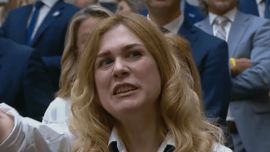Throughout the last 40 years, nobody has spent more time close to the president than his Justice Minister Marcela Losardo, his chief confidante.
Last week, she sat down for an exclusive interview with Perfil's Jorge Fontevecchia.
You, your husband, Fernando Mitjans, and Alberto Fernández’s first wife [Marcela Luchetti] were all university classmates in the early 1980s. Labour Minister Claudio Moroni and Ambassador to Washington Jorge Argüello formed part of the same student group. There cannot be many cases of a group sticking together for so many years and advancing so far. To what do you attribute that?
That’s true, we all knew each other in the Law Faculty when we were very young, in our 20s. The group actually included many more but each of us went their separate ways.. I was a classmate of Alberto, of Marcela [Luchetti] and Moroni, not of Argüello but he was in our group. We were all professionally but also politically linked. Alberto was always a group leader.
You accompanied Alberto Fernández throughout his public career for decades, in the Superintendencia de Seguros monitoring the insurance world in the 1990s, then his chief advisor when he was Néstor Kirchner’s Cabinet chief and now that he’s president, you’re Justice minister, the most controversial area alongside the Economy portfolio. How did you create such confidence over the years?
We were together in all the posts, even in private activity because when we were not involved in the public sector, we shared a law office. We were in the Superintendencia de Seguros, Bapro [the Buenos Aires provincial bank] and the City Legislature. I directed the General Legislation and Labour Committee when he was deputy on Argüello’s list and that gave me my experience of the legislative branch. Afterwards, when Alberto was Cabinet chief, Alberto Iribarne was appointed Justice minister after 18 months and he asked Alberto: “Can I take Marcela Losardo as my Justice secretary?” He called me at 11pm and said to me “Would you like to go and be Justice secretary?” It was a very nice post. I always say that all jobs were different, apart from the private profession, which is highly complementary. In the Cabinet Chief’s office you see the map of the whole country. When you’re in a ministry, you’re obviously more limited.
Is it correct to say that you’re the true professional partner of Alberto Fernández, or is there some other official who has accompanied him in his various posts all these years?
We both developed confidence in each other,You develop a link which, like friendship, stems from affection but professional ties are completely different. You’re often great friends with somebody but professionally incompatible, or you don’t get on well and you have some very good friends but you’d never work with them. You can also come together from different starting-points. Because when you work with a person in a law office, you’re partners on an equal footing. But in other cases he’s the Cabinet chief or the insurance superintendent so he’s there as boss and you’re the subordinate so you have to bond from a different level, accepting the other’s position.
In 1999 you founded Inmueble Callao 1960 SA with Alberto Fernández. Did that inspire the name “Grupo Callao”?
When we left Banco Provincia, we started looking for a place for our law firm and we bought an office on Callao 1960, which became our address. In our latter stages we held political meetings and that is how Grupo Callao came about.
According to Página/12, when you took your oath as minister of Justice, you burst into tears and Alberto Fernández took you in his arms and whispered to you: “Don’t cry because you’ll make me cry too.” Was that so?
Yes because I was very moved and every time I think of it, I get very moved again. It’s very emotional to be with a friend and workmate of all your life and suddenly you see he’s the president. And it’s also very emotional from my position to take the oath as the first female minister of Justice, a position which is really marvellous and at the same time a challenge and a huge responsibility at a very special moment. So when I took the oath, he said to me: “Don’t cry because you’ll make me cry too,” and I tried to absorb my own tears but out of sheer emotion I said: “Yes, I swear,” and fled. Then he said to me: “Now come and sign.” I’d forgotten to sign!
What’s the difference between Alberto Fernández in the Superintendencia de Seguros of the 1990s, as Cabinet chief at the start of this century, and as president today?
Alberto Fernández is somebody who has prepared himself all his life for this position with great effort. The president is somebody who has worked very hard with great commitment. Obviously he’s not the same person in terms of his experience and capacity. But as for his personality, he’s the same sensitive person with the same character.
What do you think when they dismiss the president as a puppet of the vice-president?
That they do not know him. He can be a subaltern, as when he was the Cabinet chief under the Néstor Kirchner presidency. But today he’s the president. Today he takes and applies the decisions, today he runs the country – listening to everybody because he listens to all his ministers but taking the decisions.
Your husband is a notary and chairs the Disciplinary Committee of the AFA [Argentine Football Association]. He entered into controversy when an audio in which (then-Boca Juniors president Daniel) Angelici pleaded for light sanctions for his players reached AFA via Mauricio Macri. How much fantasy and how much reality is there in the existence of a judicial panel [“mesa judicial”] during the Macri government under Angelici?
Here we have to separate things. My husband Fernando Mitjans is a notary who has been for 26 years in the AFA where they have appointed him president of the Disciplinary Tribunal, making his entire career there. The great love and driving passion of his life is football and he works without any fees because he really and passionately likes it. He’s an excellent professional and a person of íntegrity. His father was also linked to football as a vice-president of Boca and also in AFA, it’s in the genes. But that’s not something which has anything to do with me because I understand nothing of football. My husband has no links to the Justice Ministry or politics and I have nothing to do with football, full stop.
As for the judicial panel, yes, it existed under that and other governments as recognised by [Macri’s vice-president] Gabriela Michetti. I don’t know who was in it exactly. I’ve been told but, well, I don’t like to talk about things beyond my ken but yes, there was a judicial panel.
Isn’t it logical for the government to have a committee to follow judicial issues formed by the minister, the main officials and advisors from related areas?
That’s something else. It’s one thing to have a group which does not exist either but the judicial panel means quite another. We may form a work group to discuss an amendment, as when judicial reform was the issue. What warrants criticism is intervening in judicial cases and verdicts while not respecting judicial independence. That’s a judicial panel in the sense of which we’re talking. That is what this government does not do and which I as a minister would never do. So when the president said that judicial operations and panels were over, that’s what he said and he’s carrying it out. You cannot have a ministry with members who talk about how cases are proceeding or interceding in those cases. It does not exist nor will it exist. It did exist and that’s what happened.
How do you stay informed in cases which might carry political effects?
We can visualise what might happen in fundamental sentences. It’s also true that the judges know the consequences of judicial rulings but that’s an issue which each one will have to handle from his bench. The judge must know and apply the legal procedure and obviously evaluate the impact and consequences it might have for the executive branch.
How has the relationship between the Justice Ministry and the intelligence agency (today AFI, in its Spanish acronym) changed since when you were Justice secretary between 2005 and 2009?
I only went once to their headquarters on 25 de Mayo street when I accompanied then-Justice minister Alberto Iribarne who had just taken over because we had a meeting with them regarding the Unidad AMIA [probing the 1994 terrorist attack]. I did not renew the contact subsequently nor do I now.
Did you know [intelligence agent Jaime] Stiuso?
Yes, I got to know Stiuso then when he presented us the report. Today AFI under Cristina Caamaño’s trusteeship does not intervene in judicial issues, having changed totally. Today there’s no wiretapping, espionage or a load of stuff we had before. Today’s AFI is dedicated to what it ought to be doing – not intelligence but fighting iterrorism and organised crime.
How was it that during Macri’s government you joined the Human Rights department between 2016 and 2017 and ended up being fired by then-Justice minister Germán Garavano?
A former student of the president was appointed undersecretary for the Protection of Human Rights and as he lacked experience, Alberto asked me to help him out and I joined, accompanying him technically.
After a while, when Alberto differed over human rights policies, they asked me if I could intercede in some way or make him change his mind.
Who asked you?
The person I was working with. But it doesn’t matter. Generally they followed a single line, somebody must have told him.
Profesor Charles Dunlap, of the Duke University School of Law in the United States, created the neologism “lawfare,” referring to the use of the law as a weapon of warfare to discredit political adversaries. How much fantasy and how much reality is there in the influence of lawfare in corruption trials in South America?
There is plenty of reality and a bit of fantasy. In Brazil, [former presidents] Dilma Rousseff and [Luiz Inácio] Lula [da Silva], for example, were both víctims of lawfare, which makes use of justice and the judicial system.
Dilma Rousseff was not accused of corruption.
But she was kicked out for modifying budget allocations. And I also wonder whether there was any truth in the corruption cases. In Lula’s case it was lawfare because he was remanded in custody [Editor’s note: there was no pre-trial imprisonment but only following final convictions in two cases]. It could be that corruption exists and it must be condemned but accusing people who had nothing to do with corruption is something else.
How come, with regard to Odebrecht, there were not only confessions of businessmen who paid bribes and even returned hundreds of millions of dollars but also convictions in various countries, and yet no advance with cases in Argentina?
Well, you’d have to ask that to the judges trying the cases, wouldn’t you?
And what would be your conjecture?
That something has to change in the judicial system, which is precisely why we presented the judicial reform with a view to a different form of justice, by which we mean an independent judiciary. And by “independent” we understand no political interference or pressures or judges who yield to pressure. We have to work on that.
What do you think of the recommendation of [former Supreme Court justice Eugenio] Zaffaroni of some form of political solution to corruption cases, and the subsequent opposition request that he be removed from his inter-American bench for those statements?
Zaffaroni is an excellent academic, an excellent judge and it seems to me that you might or might not share his opinions but you have to respect them. The president has already stated his position on a pardon and said that it is not possible.
But do you consider that some other type of political solution would be necessary?
No. The solutions have to be judicial because such are the problems. The problems of the justice system have to be resolved by the justice system, If judicial problems are resolved politically, it would be a dysfunctional society because we would be replacing justice with politics.
Explain your vision of the reform languishing in Congress for the last half year.
We’ve now sent it to the Chamber of Deputies for the extraordinary sessions because it has already been approved by the Senate. It’s very important to have this reform in order to reorder federal and provincial justice, so that the federal courts are unified within the adversarial criminal justice system while the provinces can work better.
It really hits me when I hear people say that a pandemic is not the time for this reform or that it costs too much, I would ask: What is the cost of justice? What is the cost for a mother who lost a child victim of white slavery or drug-trafficking and has to wait? Or AMIA 26 years on or any other of so many crimes from 10 to 20 years ago? How much does it cost the judge working on that case, what’s the cost of justice there? When we’re talking about time, what does a provincial judge do when he has to handle criminal justice and mining law while combating a drug-trafficking ring all at the same time?
You said that we must optimise the functioning of the Supreme Court, rethinking the scope of extraordinary appeals. Would you support a new Superior Tribunal to resolve questions today decided by the Supreme Court?
That’s not defined. The commission of legal experts formed by the president is working on that and there’s still nothing defined. I won’t say anything until I’ve spoken to the President and we know what we’re going to do. There are many questions to discuss - the Magistrates Council, trial by jury, the Supreme Court, the Attorney-General – many questions which we are evaluating and reading up. Let’s see what’s presented.
What I do know is that there are questions which must be treated, for example, the issue of extraordinary appeal where the Supreme Court cannot legally give the grounds for rejection because it is so established. But it’s a very old law which needs amending and is already beginning to be amended for final sentences, followed by arbitrary sentences and other creations of jurisprudence. That must be reviewed so it works differently.
There was a similar issue recently with [former vice-president Amado] Boudou and without ruling on that case, we have to say that a former vice-president might have been given an answer as to why his appeal was turned down. The Supreme Court accepted a per saltum for [federal judges Leopoldo] Bruglia and [Pablo] Bertuzzi, it seems to me a former vice-president is important enough to be owed an explanation.
Doesn’t the fear of seeking the ex-president’s impunity justify the per saltum?
I see things differently. That was installed even before we presented the reform with people talking about the reform for impunity. There is not a single article in this reform giving impunity to anybody because the judges will continue trying the cases they have in the same courtrooms.
They installed this theme of impunity and continue doing so permanently. We have to give battle and that is why we demonstrate that this reform is not so. It’s an issue which really bugs me because there’s not a single article which can permit impunity, quite the contrary. This is the opposition’s work, which is also related to some bad information in the media. It’s deplorable.
Cristina Fernández de Kirchner specifically wrote about the judicial reform quite pejoratively: “This bill has been misnamed ‘judicial reform’.”
Judicial reform is one way of putting it. We presented a bill to reorganise and reorder federal justice nationwide, calling it a judicial reform, which is what I call it too. What the vice-president was saying was that in order to reform the entire judicial system, various things were needed and we were only amending one of those questions with a judicial reform being much broader. That’s how I interpreted her, I never understood it pejoratively.
What is your relationship with the vice-president?
I don’t see her. The vice-president is in the Senate and I’m in the executive branch so I have no link to her. I know her, of course, because I worked under Néstor Kirchner and also during her presidency.
Did you feel alluded to when she referred to “functionaries who do not function”?
The press always places me on that list. They place me and my husband, relating him to football and Angelici. But these are not questions which I feel as affecting me or alluded.
As for my ministry, they should understand that even with the pandemic we’re working very hard, I go home very late. I love with passion what I do. So I don’t feel in any way alluded, sincerely.
On January 9, Infobae published an article saying that there was an offensive endorsed by a subordinate official of your ministry with proven links to Instituto Patria who seeks to succeed you by accusing you and your husband of having offshore accounts, which you denied. What happened there?
Nothing. All lies and fallacies. I denied it. Of course, it is unclear whether with “subordinate official” they were referring to Juan Martín Mena.
Justice Secretary Juan Martín Mena, virtual deputy minister and a man enjoying the utmost confidence of Cristina Fernández de Kirchner, who made him the second-in-command at AFI intelligence under Oscar Parrilli.
I get on well with him, we work well together, we’re a team, even with different origins. I don’t know if he comes from Instituto Patria. We also work very well with María Laura Garrigós, who I believe does come from Instituto Patria and is undersecretary for the Penitentiary Service.
You said: “If we cannot sort out justice, we cannot emerge as a country.” Why?
Justice is where you resolve conflicts and if you cannot resolve them because the judge is dishonest or inefficient, that produces a violent society. Democracy needs a judiciary which in some way controls things and puts them in their place. You cannot live without justice.
What’s your opinion on the recent paid ad in favour of Boudou?
No, I’m the Justice minister and I really should not comment.
But the Interior minister signed it.
OK, but I’m the Justice minister.
And what’s your opinion on the issue?
The law establishes house arrest for convicts as much as defendants. That somebody is tried and convicted does not alter the possibility of obtaining house arrest if within the parameters.
It also seems necessary to me to explain that house arrest does not mean release since the sentence continues to be served. If the parameters at the time when he was granted house arrest are correct, he may keep it. I don’t know.
One last question, what is your opinion of the ‘cuadernos’ (“notebooks”) corruption trial?
It’s difficult for me to speak on this topic but it’s a case with many irregularities from the start with photocopies, whistleblowers and disrespect for the formal registration of evidence, irregularities which must be resolved within the judicial branch. Those irregularities will be the object of analysis and must be corrected.


























Comments